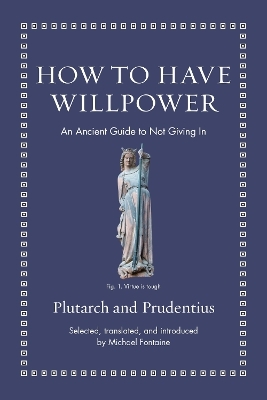
How to Have Willpower
An Ancient Guide to Not Giving In
Seiten
2025
Princeton University Press (Verlag)
978-0-691-22034-5 (ISBN)
Princeton University Press (Verlag)
978-0-691-22034-5 (ISBN)
- Noch nicht erschienen (ca. Juli 2025)
- Portofrei ab CHF 40
- Auch auf Rechnung
- Artikel merken
Lively new translations of two classical works that offer wise advice about how to resist temptation
How to Have Willpower brings together two profound ancient meditations on how to overcome pressures that encourage us to act against our own best interests—Plutarch’s essay On Dysopia or How to Resist Pressure and Prudentius’s poetic allegory Psychomachia or How to Slay Your Demons. Challenging the idea that humans are helpless victims of vice, these works—introduced and presented in vivid, accessible new prose translations by Michael Fontaine, with the original Latin and Greek texts on facing pages—emphasize the power of personal choice and the possibility of personal growth, as they offer insights and practical advice about resisting temptation.
In the spirit of the best ancient self-help writing, Plutarch, a pagan Greek philosopher and historian, offers a set of practical recommendations and steps we can take to resist pressure and to stop saying “yes” against our better judgment. And in a delightfully different work, Prudentius, a Latin Christian poet, dramatizes the necessity to actively fight temptation through the story of an epic battle within the human soul between fierce warrior women representing our virtues and vices.
Plutarch and Prudentius insist that we allow pressure or temptations to get the best of us. But they also agree that we can do something about it. And their wisdom can help.
How to Have Willpower brings together two profound ancient meditations on how to overcome pressures that encourage us to act against our own best interests—Plutarch’s essay On Dysopia or How to Resist Pressure and Prudentius’s poetic allegory Psychomachia or How to Slay Your Demons. Challenging the idea that humans are helpless victims of vice, these works—introduced and presented in vivid, accessible new prose translations by Michael Fontaine, with the original Latin and Greek texts on facing pages—emphasize the power of personal choice and the possibility of personal growth, as they offer insights and practical advice about resisting temptation.
In the spirit of the best ancient self-help writing, Plutarch, a pagan Greek philosopher and historian, offers a set of practical recommendations and steps we can take to resist pressure and to stop saying “yes” against our better judgment. And in a delightfully different work, Prudentius, a Latin Christian poet, dramatizes the necessity to actively fight temptation through the story of an epic battle within the human soul between fierce warrior women representing our virtues and vices.
Plutarch and Prudentius insist that we allow pressure or temptations to get the best of us. But they also agree that we can do something about it. And their wisdom can help.
Michael Fontaine is professor of classics at Cornell University. His books include four other volumes in the Ancient Wisdom for Modern Readers series, How to Drink, How to Grieve, How to Tell a Joke, and How to Get Over a Breakup (all Princeton).
| Erscheint lt. Verlag | 15.7.2025 |
|---|---|
| Reihe/Serie | Ancient Wisdom for Modern Readers |
| Übersetzer | Michael Fontaine |
| Verlagsort | New Jersey |
| Sprache | englisch |
| Maße | 114 x 171 mm |
| Themenwelt | Sachbuch/Ratgeber |
| Geisteswissenschaften ► Philosophie ► Ethik | |
| Geisteswissenschaften ► Philosophie ► Philosophie Altertum / Antike | |
| ISBN-10 | 0-691-22034-4 / 0691220344 |
| ISBN-13 | 978-0-691-22034-5 / 9780691220345 |
| Zustand | Neuware |
| Haben Sie eine Frage zum Produkt? |
Mehr entdecken
aus dem Bereich
aus dem Bereich


